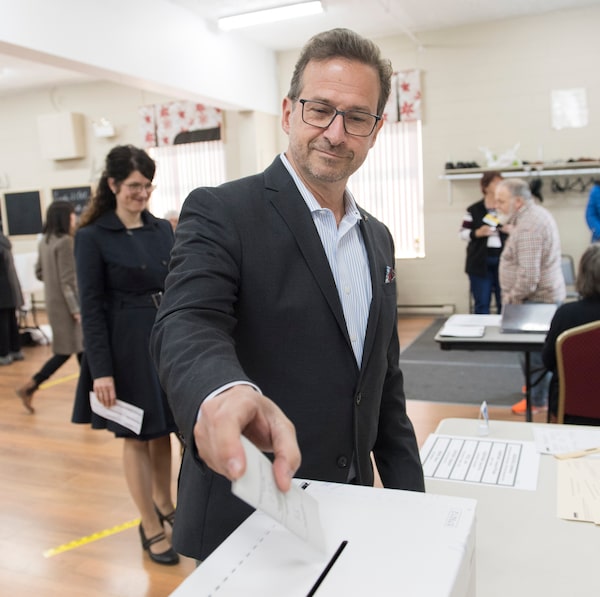
Bloc Québécois Leader Yves-François Blanchet casts his ballot on Monday.Graham Hughes/The Canadian Press
The Bloc Québécois will use its new clout in the House of Commons to ensure Canada’s minority government respects Quebec’s environmental concerns and values, but not to promote sovereignty or to prevent Parliament from working, Leader Yves-François Blanchet said.
The Bloc finished in second place in Quebec in Monday’s election, taking 32 out of 78 seats, which is more than triple its haul of 10 seats in the last federal election. The Liberal Party finished in first place with 35 seats in Quebec. The Conservatives won 10 seats and the NDP held on to only one riding, according to results at 1 am on Tuesday.
Mr. Blanchet said his party will be open to discussions with the government and the other parties in the House.
“We have to find a way to make this Parliament work,” he said in his speech to party supporters in Montreal.
He said that Quebeckers and Canadians did not elect a minority government to go back on the campaign trail in 18 or 30 months. “
They are asking us to work together, to try and make this imperfect state function,” he said.
Mr. Blanchet said the Bloc would vigorously oppose any attempt to pass a pipeline through Quebec, and will not compromise on the defense of the French language or efforts by the Quebec government to enact legislation in support of secular values.
He also made it clear the Bloc did not receive a popular mandate in the election to push or promote the sovereignty of Quebec, explaining he will take a patient approach and not force his sovereigntist agenda in Ottawa.
The Liberals remained dominant in the Montreal area and the Conservatives held on to their strongholds in the Quebec City area, while the Bloc swept through many of the suburbs to the north and south of Montreal and in many of the francophone regions outside of the major urban centres.
Rhéal Fortin, first elected as a Bloc MP in 2015, said that having official party status will make a world of difference for the party, including more speaking time in the House, an official role on parliamentary committees and a budget to hire staff and fund a research bureau. He said the Bloc will have greater powers to influence the government’s legislative agenda and the ability to challenge its decisions during Question Period.
“It changes everything,” he said, adding that status would allow the party to “offer a better performance” and “deliver on our commitments.”
Mr. Blanchet won his seat in Beloeil-Chambly, to the east of Montreal, in one of the ridings that had gone to the NDP in the 2011 and 2015 general elections. He capitalized on strong performances during the campaign’s two French-language debates, as well as his ability to craft a platform that closely mirrored the agenda of the Quebec government of François Legault.
The Bloc was known in its early days in the 1990s as a defender of Quebec’s sovereignty movement on the federal stage and an extension of the Parti Québécois in Ottawa. However, the Bloc is now seen increasingly as a party that will defend Quebec’s interest. Mario Beaulieu, a former Bloc leader who won in a riding in eastern Montreal, said the results point to a resurgence of nationalism in the province.
“We can feel that Quebec is waking up,” he said.
At the start of the election campaign, the Liberal Party was banking on making gains in Quebec to offset any losses in the rest of the country. However. Liberal Leader Justin Trudeau was placed on the defensive in the province by stating that his government could eventually challenge provincial legislation that prevents some government workers from wearing religious symbols.
Mr. Trudeau’s Liberals took 40 seats in Quebec in the previous election, well ahead of the NDP at 16, the Conservatives at 12 and the Bloc at 10. It was the second time in a row that the Bloc failed to reach the 12-seat threshold to obtain official party status in the House of Commons, after being nearly wiped out by the NDP’s Orange Wave in 2011.
A group of 18-year-olds at the Bloc’s election-night headquarters said the campaign highlighted how Quebec and the rest of Canada are going in different directions when it comes to environmental and energy issues.
“There are many sovereigntists among members of our generation because Canada is, in reality, an oil state,” Alexandre Valiquette said. The Liberal government’s purchase of the Trans Mountain pipeline expansion project in Alberta and British Columbia sealed the party’s fate in the eyes of Josiane Paradis, who carried a Quebec flag to the Bloc’s election-night gathering.
“I was proud to vote for a party that will represent Quebec, my country,” she said.
While the Bloc continues to be an officially sovereigntist party, the push for Quebec’s independence is no longer at the heart of the party’s platform.
The Bloc’s key positions during the campaign were support for Quebec’s law banning some public servants from wearing religious symbols and opposition to pipeline projects across the country, in addition to calls for greater powers for the Quebec government over immigration, language and taxation. The party also benefited from Mr. Blanchet’s steady leadership and communication skills after years of infighting in the party under previous leaders.
Mr. Blanchet promised during the campaign to promote Quebec’s interests, but not block Canadian progress, in the next Parliament. “If it’s good for Quebec, we’ll vote for; if it’s bad for Quebec, we’ll vote against; and in between, we’ll negotiate,” Mr. Blanchet said last week.